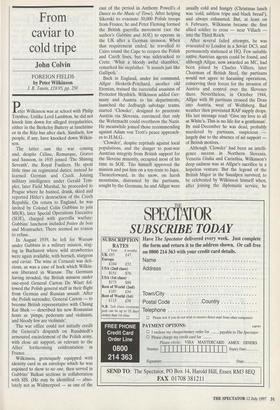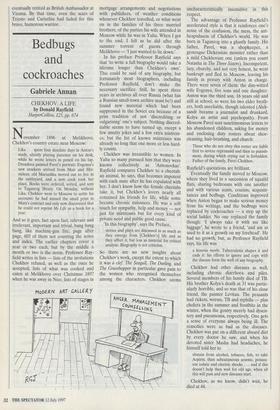From caviar to cold tripe
John Colvin
FOREIGN FIELDS by Peter Wilkinson I. B. Tauris, £19.95, pp. 250 titer Wilkinson was at school with Philip Toynbee. Unlike Lord Lambton, he did not knock him down for alleged irregularities, either in the Berkeley Buttery at lunchtime or in the Ritz bar after dark. Similarly, few people, if any, have knocked down Wilkin- son.
The latter saw the war coming and, despite Celine, Remarque, Graves and Sassoon, in 1935 joined 'The Shining Seventh', the Royal Fusiliers. He spent little time on regimental duties; instead he learned German and Czech. Joining military intelligence under Gerald Tem- pler, later Field Marshal, he proceeded to Prague where he hunted, drank, skied and reported Hitler's destruction of the Czech Republic. On return to England, he was invited by Colonel Colin Gubbins to join MI(R), later Special Operations Executive (SOE), charged with guerrilla warfare: Gubbins' luncheon included fraises du bois and Montrachet. There seemed no reason to refuse.
In August 1939, he left for Warsaw under Gubbins in a military mission, stag- ing in Bucharest where wild strawberries were again available, with bortsch, sturgeon and caviar. The wine at Cemauti was deli- cious, as was a case of hock which Wilkin- son liberated in Warsaw. The Germans having invaded, the British mission under one-eyed General Carton De Wiart fol- lowed the Polish general staff in their flight from German and Russian assault. After the Polish surrender, General Carton — to become British representative with Chiang Kai Shek — described his new Romanian hosts as 'pimps, pederasts and violinists, and bloody few are violinists'.
The war office could not initially credit the General's despatch on Rundstedt's armoured encirclement of the Polish army, with close air support, as relevant to the Allies' forthcoming confrontation in France.
Wilkinson, grotesquely equipped with identity card in an envelope which he was enjoined to show to no one, then served in Gubbins' Balkan sections in collaboration with SIS. (He may be identified — abso- lutely not as Widmerpool — as one of the cast of the period in Anthony Powell's A Dance to the Music of Time). After helping Sikorski to evacuate 30,000 Polish troops from France, he and Peter Fleming formed the British guerrilla movement (see the author's Gubbins and SOE) to operate in the UK after a German invasion. When that requirement ended, he travelled to Cairo round the Cape to reopen the Polish and Czech lines, but was sidetracked to Crete. 'What a bloody awful shambles,' remarked his stepfather. 'It sounds just like Gallipoli.'
Back in England, under his command, Alfgar Hesketh-Pritchard, another old Etonian, trained the successful assassins of Protector Heydrich. Wilkinson added Ger- many and Austria to his departments, launched the Jedburgh sabotage teams, started 'Clowder', designed to penetrate Austria via Slovenia, convinced that only the Wehrmacht could overthrow the Nazis. He meanwhile joined those recommending against Adam von Trott's peace approach- es to H.M.G.
`Clowder', despite reprisals against local populations, and the danger to post-war Austrian integrity from British support for the Slovene minority, occupied most of his time in SOE Tito himself approved the mission and put him on a toy-train to Jajce. Thenceforward, in the snow, on harsh mountains, distrusted by the partisans, sought by the Germans, he and Alfgar were usually cold and hungry' (Christmas lunch was 'cold, saltless tripe and black bread'), and always exhausted. But, at least on 6 February, Wilkinson became the first allied soldier to cross — near Villach into the Third Reich.
After several failed attempts, he was evacuated to London in a Soviet DC3, and permanently stationed at HQ. Few suitable native Austrian agents could be found, and although Alfgar, now awarded an MC, had been joined by Charles Villiers, later Chairman of British Steel, the partisans would not agree to harassing operations, conserving their forces for the invasion of Austria and control over the Slovenes there. Nevertheless, in October 1944, Alfgar with 80 partisans crossed the Drau into Austria, west of Wolfsberg. Bad weather then prevented RAF supply drops. His last message read: 'Give my love to all at White's. This is no life for a gentleman'. By mid-December he was dead, probably murdered by partisans, suspicious largely due to the absence of air support of British motives.
Although 'Clowder' had been an intelli- gence success in Northern Slovenia, Venezia Giulia and Carinthia, Wilkinson's deep sadness was at Alfgar's sacrifice in a hopeless venture. But the legend of the British Major in the Saualpen survived, to be celebrated by Wilkinson himself when, after joining the diplomatic service, he eventually retired as British Ambassador at Vienna. By that time, even the scars of Trieste and Carinthia had faded for this brave, humorous warrior.



























































 Previous page
Previous page